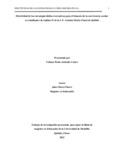Efectividad de las estrategias lúdico-recreativas para el fomento de la convivencia escolar en estudiantes de séptimo D de la I. E. Antonio María Claret de Quibdó
Effectiveness of playful and recreational strategies to promote school coexistence in seventh grade students at I. E. Antonio María Claret of Quibdó
Compartir este ítem
Autor
Andrade Castro, Yohana Paola
Citación
Metadatos
Mostrar el registro completo del ítemDocumentos PDF
Resumen
La presente investigación tiene como objetivo determinar la efectividad de las estrategias lúdico-recreativas para el fomento de la convivencia escolar en los estudiantes del grado séptimo D de la I. E. Antonio María Claret de Quibdó. Para ello, se empleó un enfoque cuantitativo, con diseño preexperimental mediante una prueba pretest, luego una intervención pedagógica, para cerrar con un postest. La muestra seleccionada fue un grupo del grado séptimo, formado por cuarenta estudiantes. Se utilizó con ellos una encuesta sobre convivencia escolar (adaptacion del instrumento de convivencia de Ortega y del Rey). Los resultados indicaron que existen dificultades de convivencia entre los estudiantes del grado séptimo D y de estos con los docentes. Luego de la intervención, se concluyó que las diferentes actividades lúdico-recreativas que se realizaron, fueron efectivas para el fomento de la convivencia escolar, ya que permitieron más integración entre los estudiantes y de estos con los docentes, dado a que participaron de actividades de exploración, esparcimiento y libertad de expresión que les permitieron mejorar su comportamiento, dentro y fuera del aula. The objective of this research is to determine the effectiveness of ludic-recreational strategies for the promotion of school coexistence in seventh grade D students of the I. E. Antonio María Claret de Quibdó. For this, a quantitative approach was used, with a pre-experimental design through a pre-test, then a pedagogical intervention, to close with a post-test. The selected sample was a group of seventh grade, made up of forty students. A survey on school coexistence (adaptation of the Ortega and del Rey instrument) was used with them. The results indicated that there are difficulties of coexistence between the students of the seventh grade and of these with the teachers. After the intervention, it was concluded that the different ludic-recreational activities that were carried out were effective for the promotion of school coexistence, since they allowed for more integration between the students and between them and the teachers, given that they participated exploration activities, recreation and freedom of expression that allowed them to improve their behavior, inside and outside the classroom.
Colecciones
- Tesis [737]


